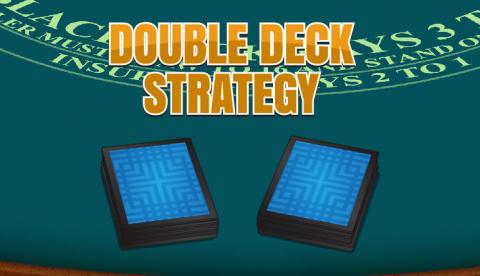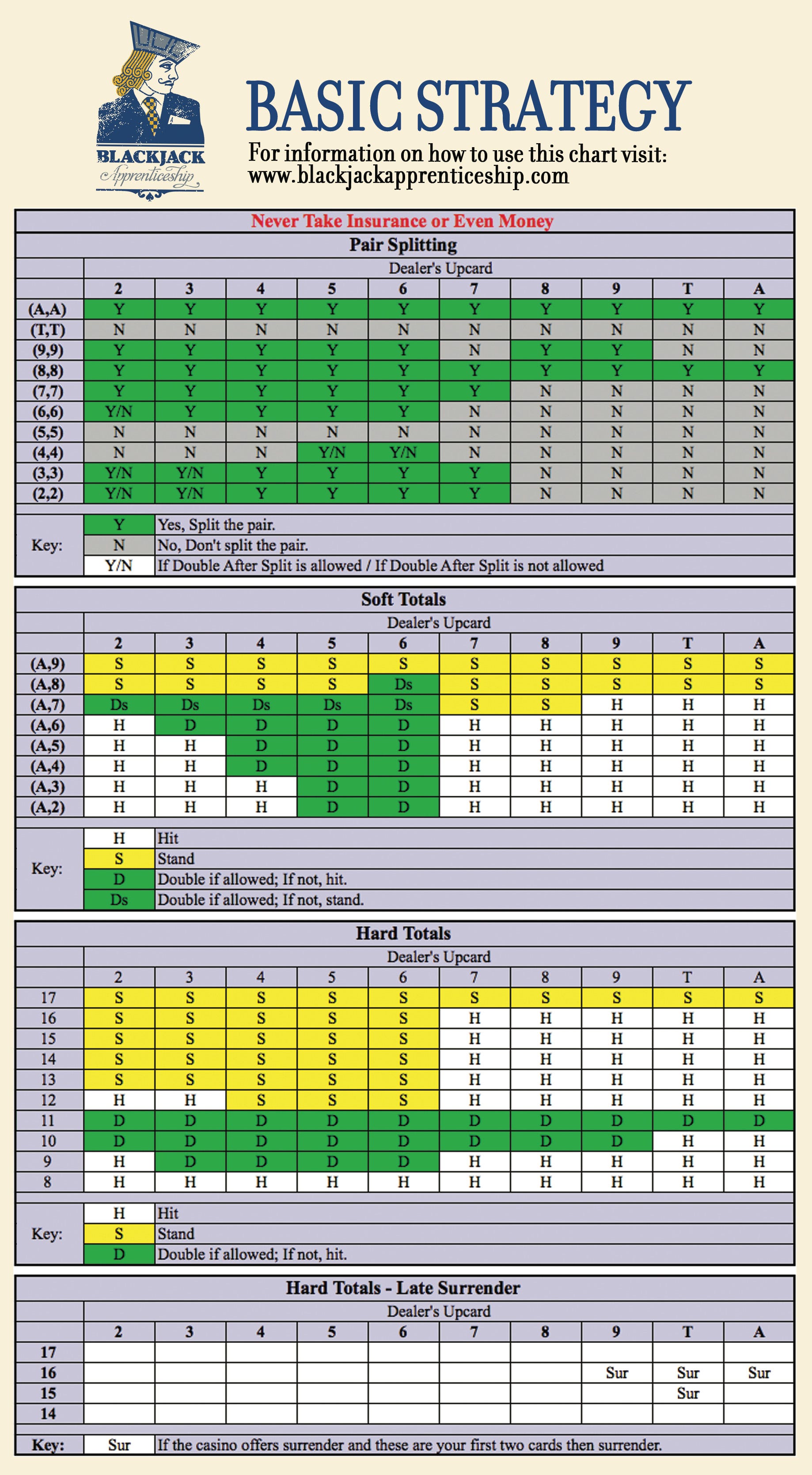Double Deck Blackjack Counting Strategy
Card Counting Systems > Speed Count
- Double Deck Blackjack Counting Strategy For Beginners
- Double Deck Blackjack Counting Strategy Games
- Double Deck Blackjack Counting Strategy Rules
- Double Deck Blackjack Counting Strategy Strategies

The blackjack card counting strategy relies on an estimate of the value of the cards that have been dealt, as an indication of the ones that remain to be dealt.
Dan Pronovost, gambling teacher and creator of several gambling tactics, came up with Speed Count as an answer to a friendly question. When asked if there was an easier way for the average gambler to count cards and gain an edge over the casino, Dan came up with Speed Count.
- Ken Uston developed another card counting system called the Advanced Point Count (APC) in the early 1981s. He wrote in detail about the strategy in his most famous book called 'Million Dollar Blackjack'. The Uston APC is actually one of the more complicated methods of counting cards. In fact, it is a level III (level 3) system.
- If you haven’t tried Double Deck Blackjack at the Casinos of Winnipeg, here are 5 things you need to know! Blackjack Strategy. THE EASIEST WAY TO LEARN HOW TO COUNT CARDS FOR BEGINNER.
Dan and his friend noticed that most gamblers needed as much as 80 hours of training before learning even the most basic High-Low counting system, and that in reality only a small percentage of gamblers could put a High-Low count into practice effectively. The Speed Count method was Dan’s answer to this problem.
Editor’s Picks for Best Online Blackjack in 2020
- Multiple blackjack games
- Publicly traded company
- Multi award winner
- RTG Blackjack
- ViG Live Blackjack
- BTC Bonuses
Double Deck Blackjack Counting Strategy For Beginners
- Live Dealer Blackjack
- 24/7 Live Support
- Trusted since 2007
- Online and mobile blackjack
- Great for U.S. based players
- New and fresh
The Basics of the Speed Count
Blackjack writers tell us that the average hand of blackjack is 2.7 cards, meaning more people take three cards than two. Since there are just 5 “small” cards for every 13 “big” cards in a 52-card deck, we get an average of 1.03 “small” cards for every hand of blackjack played–about one card per hand, regardless of how many people are playing, how many decks are in play, etc.
Using this number, you have all you need to build the Speed Count method. Simply count all the “small” cards on the table as “+1” and at the end of each round, subtract the total number of hands dealt. This includes split hands. As your count gets higher, there are fewer “small” cards in the deck, giving you an advantage.
How Much of an Edge does the Speed Count Offer?
According to an independent audit by the University of Massachusetts, the Speed Count produced a player edge of just over 1% over the course of a billion rounds of blackjack. This is about three times better than the expectation afforded blackjack players who play according to perfect strategy, and the method is even easier to implement than basic blackjack strategy.
Speed Count requires an understanding of basic blackjack strategy so that you know how to properly play most gaming situations, but since casinos allow you to carry your strategy card with you to the blackjack table, the creators of the Speed Count method seem to put little emphasis on learning this strategy. Instead, they encourage people who want to learn Speed Count to shell out hundreds of bucks for a two-day seminar, and if red flags are going up for you, you’re not alone.
The fact that you have to take a seminar to learn the ins and outs of Speed Count mean that most people won’t both. If I have to buy a book or take a high-priced seminar to learn something, I’d rather not learn it at all.
The inventors of Speed Count have done a great job keeping the details of this method secret. But from the presentation of an independent audit and a few details of the counting system, it looks like it would work to some degree. The inventor of the Speed Count has admitted openly that more complex counting systems, like KO, offer a better advantage, but suggests that most people won’t ever be able to learn these more difficult systems, so a system like Speed Count is ideal for people without 80 or 120 hours to learn harder card counting methods.
Speed Count is one of many new card counting methods aimed at people who’ve had trouble memorizing card counting tactics in the past. If you want to learn more about Speed Count, you’ll have to contact the company that owns the license. Be careful paying for any card counting method that doesn’t reveal more details than a few cursory lessons and a mathematical audit–you may serve yourself better learning one of the higher level counting systems that take a little bit of time to perfect.
Double Deck Blackjack Counting Strategy Games
Related News
Double Deck Blackjack Counting Strategy Rules
I'm currently in the process of switching to the HiLo system and I mostly play Double Deck, H17, DA2, DAS upto 4 hands, No Surrender. Ideally I would like to know the index plays for -6 to +6 for this game. I18 for this game would be fine as well. Could someone please provide this information for me please? Is there a computer program that lists the index plays for number of decks and rules and counting system used? Thank you for your help.Double Deck Blackjack Counting Strategy Strategies
CVCX and CVBJ have index numbers. Or look online.
Take Insurance at +3
8 dbls against 4 (+5)
8 dbls against 5 (+3)
8 dbls against 6 (+1)
9 dbls against 2 (+1)
9 hits against 3 (-1)
9 hits against 4 (-3)
9 hits against 5 (-5)
9 dbls against 7 (+3)
10 hits against 8 (-5)
10 hits against 9 (-2)
10 dbls against 10 (+4)
10 dbls against Ace (+3)
11 hits against 9 (-5)
11 hits against 10 (-5)
11 dbls against Ace (0)
12 stands against 2 (+3)
12 stands against 3 (+1)
12 hits against 4 (0)
12 hits against 5 (-2)
12 hits against 6 (-4)
13 hits against 2 (-1)
13 hits against 3 (-3)
13 hits against 4 (-5)
13 hits against 5 (-5)
14 hits against 2 (-4)
15 stands against 10 (+4)
15 stands against Ace (+5)
16 stands against 9 (+5)
16 stands against 10 (0)
16 stands against Ace (+3)
There are more if you want the deviations for splits & soft hands (most players don't). Would you like me to provide them?

9 dbls against 2 (+1)
iirc it's standard BS to double 9 against 2 in a DD game
You're switching to HiLo? What were you using before?
CVCX and CVBJ have index numbers. Or look online.
I'd like to know as well. Although it wasn't asked, I think I'd be remiss not to point out that Hi-Lo is not the best count for double deck. If a change is being made then perhaps this is a good time to look into something else.

 Thank you everyone for the info and support. This community exceeded my expectations once again.
Thank you everyone for the info and support. This community exceeded my expectations once again.Lots of times, people look at different counting systems and compare EV and difficulty. Both are definitely necessary to take into consideration, but, I think people tend to overestimate the strength of EV when deciding a count.
Better yet, you should look at numbers like N0, variance/std dev, SCORE, etc.
The main problem with HiLo is that it values all 2-6's equally (and Tens and Aces equally as well). This is a bit of a problem, especially when playing single or double deck games, as 2's and 6's are not equal (they have significantly different EORs).
If the cards were evenly distributed in the shoe, then yeah, HiLo would work fine -- but remember, you gain your edge when the cards are NOT evenly distributed throughout the shoe. You gain an edge when they are distributed unequally (little cards up front, aces/faces in the back).
In my opinion, if you're ONLY going to play single/double deck, you should learn something like HiOptII w/ ASC (Ace Side Count). If you're going to play primarily pitch games and play a little shoe games (or might play shoes in the future), then learn something like the Zen count. Personally, I like Zen count -- it's strong enough for pitch games but is also easy enough for shoe games. Granted, it is more difficult than HiLo, but not significantly. If I were you, I'd learn Zen.
But really -- buy CVCX, it's like $100 max. Run a bunch of sims using different counts, different games/rules/spreads/etc. Look at numbers like EV/hour, N0, and SCORE. IMO, that's the best way to determine which counting system you should learn.